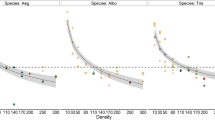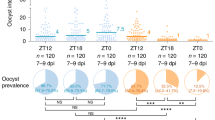Abstract
INVESTIGATION of a population of adult Anopheles melas (=A.gambiœ var. melas), conducted during 1941, showed that their numbers underwent regular fluctuations, with very marked peaks at eight-day intervals, and that the only exceptions to this rule were when the rhythm was broken by the dominating influence of tides1. At the time it was difficult to suggest a reason for the fluctuations, because work on both A. melas and its close relative A. gambiœ, by various people, indicated that the life-cycle must occupy at least ten days. Similar fluctuations were found in an A. funestus population at twelve- to fourteen-day intervals, although the supposed time for its complete life-cycle was about twenty days. I tentatively suggested that the fluctuations might be due to intraspecific competition, although this explanation seemed most unlikely.
This is a preview of subscription content, access via your institution
Access options
Subscribe to this journal
Receive 51 print issues and online access
$199.00 per year
only $3.90 per issue
Buy this article
- Purchase on Springer Link
- Instant access to full article PDF
Prices may be subject to local taxes which are calculated during checkout
Similar content being viewed by others
References
Ribbands, C. R., Bull. Ent. Res., 36, 271 (1944).
Author information
Authors and Affiliations
Rights and permissions
About this article
Cite this article
RIBBANDS, C. Anopheline Life-Cycles and Population Fluctuations. Nature 157, 232–233 (1946). https://doi.org/10.1038/157232c0
Issue Date:
DOI: https://doi.org/10.1038/157232c0
Comments
By submitting a comment you agree to abide by our Terms and Community Guidelines. If you find something abusive or that does not comply with our terms or guidelines please flag it as inappropriate.



